The Latest on the fatal shooting over a parking spot in Florida (all times local):
10:45 p.m.
A Florida jury has convicted a white man of manslaughter in the fatal shooting of an unarmed black man in a dispute over a handicapped parking spot.
The jury of five men and a woman deliberated for more than six hours Friday before convicting Michael Drejka. He faces up to 30 years in prison.
He was charged with the July 2018 death of Markeis McGlockton.
Drejka had confronted McGlockton's girlfriend for parking in a handicapped space while McGlockton went into a convenience store. Security video recorded McGlockton leaving the store and shoving Drejka to the ground. Seconds later, Drejka pulled out a handgun and shot the 28-year-old McGlockton as he backed away. McGlockton ran inside the store, where he collapsed and died.
Drejka told the detectives he has a "pet peeve" about illegal parking in handicapped spots.
10:10 p.m.
The jury sent a confusing note to the judge in the manslaughter trial of a white Florida man charged with fatally shooting an unarmed black man after being shoved during a parking lot altercation.
Circuit Judge Joseph Bulone asked the six-member panel trying Michael Drejka for the July 2018 shooting of Markeis McGlockton what they meant when they sent a note to him late Friday that restated portions of Florida's self-defense law.
They said they were having difficulties understanding the law. Bulone reread them the lengthy statute, which generally says Drejka could shoot McGlockton if a reasonable person under the same circumstances would believe he is in imminent danger of death or great bodily injury.
The jury had deliberated past 10 p.m., six hours after they received the case.
9:15 p.m.
Jurors deliberated late into the night as they decided the fate of a white Florida man charged with fatally shooting an unarmed black man after being shoved during a parking lot altercation.
The six-member panel remained in the Clearwater courthouse past 9 p.m. Friday as they debated whether Michael Drejka is guilty of manslaughter for the July 2018 death of 28-year-old Markeis McGlockton.
Prosecutors say Drejka provoked the confrontation by arguing with McGlockton's girlfriend because she was parked in a handicapped-accessible parking spot and had no reason to fire because McGlockton was backing away.
Drejka's attorneys say McGlockton provoked the shooting by pushing their client to the ground, making him fear he was about to be severely injured or killed.
4:25 p.m.
Jurors are deliberating the fate of a white Florida man charged with fatally shooting an unarmed black man after being shoved during a parking lot altercation.
The six-member panel in Clearwater began discussions late Friday afternoon on whether Michael Drejka is guilty of manslaughter for the July 2018 death of 28-year-old Markeis McGlockton.
Prosecutors say Drejka provoked the confrontation by arguing with McGlockton's girlfriend because she was parked in a handicapped-accessible parking spot and had no reason to fire because McGlockton was backing away.
Drejka's attorneys say McGlockton provoked the shooting by pushing their client to the ground, making him fear he was about to be severely injured or killed.
3:20 p.m.
A defense attorney for a white Florida man on trial for fatally shooting an unarmed black man after being shoved during a parking lot altercation said in closing arguments that the victim caused his own death.
Michael Drejka's defense attorney said Friday that Markeis McGlockton caused his own death by shoving the defendant and that Drejka was only protecting himself by firing his gun.
Drejka fatally shot the 28-year-old McGlockton in July 2018. In video shown to the jury, Drejka told detectives that after McGlockton pushed him, he feared he was about to be further attacked and severely injured.
Prosecutors argue that Drejka started the altercation by confronting McGlockton's girlfriend because she was parked with her children in the handicapped space. They also say he had no reason to fire as McGlockton was retreating.
12:50 p.m.
A prosecutor told jurors the white man who fatally shot an unarmed black man after being shoved to the ground is a "vigilante" who carried a handgun because he liked provoking confrontations.
Prosecutor Scott Rosenwasser told jurors during closing arguments Friday in Clearwater, Florida, that Michael Drejka provoked Markeis McGlockton to shove him by yelling at McGlockton's girlfriend because she was parked in a handicapped-assessable space and then fired as the 28-year-old McGlockton started to flee.
Rosenwasser said the 49-year-old Drejka is guilty of manslaughter because he had no reasonable belief that he was about to be seriously injured or killed during the July 2018 altercation.
In video shown to the jury, Drejka told detectives that after McGlockton pushed him, he feared he was about to be further attacked and severely injured.
10:50 a.m.
The Florida man on trial for fatally shooting an unarmed black man after being shoved to the ground during a parking lot altercation will not testify on his own behalf.
Michael Drejka told the court Friday in Clearwater, Florida, that he won't testify at his manslaughter trial, which is rapidly moving to its conclusion.
Drejka, who is white, fatally shot 28-year-old Markeis McGlockton in July 2018. In video shown to the jury, Drejka told detectives that after McGlockton pushed him, he feared he was about to be further attacked and severely injured.
Prosecutors argue that Drejka started the altercation by confronting McGlockton's girlfriend because she was parked in the handicapped space. They also say he had no reason to fire as McGlockton was retreating.
Closing arguments are expected later Friday.
VENICE, Italy (AP) — Under the gaze of the world’s media, the fragile lagoon city of Venice launched a pilot program Thursday to charge day-trippers a 5-euro (around $5.35) entry fee that authorities hope will discourage visitors from arriving on peak days and make the city more livable for its dwindling residents.
Visitors arriving at Venice's main train station were greeted with large signs listing the 29 dates through July of the plan's test phase, as well as new entrances separating tourists from residents, students and workers.
Stewards were on hand to politely guide anyone unaware of the new requirements through the process of downloading the QR code to pay the fee.
“We need to find a new balance between the tourists and residents,’’ said the city’s top tourism official, Simone Venturini. “We need to safeguard the spaces of the residents, of course, and we need to discourage the arrival of day-trippers on some particular days.”
Arianna Cecilia, who lives in Rome and was visiting Venice for the first time with her boyfriend, said it felt “strange" to have to buy a ticket to enter a city in her native Italy, and then pass through a tourist entrance.
The couple were staying in nearby Treviso, and had paid the fee and downloaded the QR code as required prior to arrival.
Workers in yellow vests carried out random checks at the train station, and anyone caught faces fines of 50 euros to 300 euros — though officials said “common sense” was being applied for the launch.
The requirement applies only for people arriving between 8:30 a.m. and 4 p.m. Outside of those hours, access is free and unchecked.
Venice has long suffered under the pressure of over-tourism, and officials hope the pilot project can help provide more exact figures to better manage the phenomenon.
The city can track the number of hotel visitors — which last year numbered 4.6 million, down 16% from pre-pandemic highs. But the number of day visitors, which make up the majority of the crowds in Venice, could only be estimated until recently.
A Smart Control Room set up during the pandemic has been tracking arrivals from cell phone data, roughly confirming pre-pandemic estimates of 25 million to 30 million arrivals a year, said Michele Zuin, the city’s top economic official. That includes both day-trippers and overnight guests.
But Zuin said the data is incomplete. “It’s clear we will get more reliable data from the contribution” being paid by day-trippers, he said.
Venturini said the city is strained when the number of day-trippers reaches 30,000 to 40,000. Its narrow alleyways are clogged with people and water taxis packed, making it difficult for residents to go about their business.
Not all residents, however, are persuaded of the efficacy of the new system in dissuading mass tourism. Some say more attention needs to be paid to boosting the resident population and services they need.
Venice last year passed a telling milestone when the number of tourist beds exceeded for the first time the number of official residents, which is now below 50,000 in the historic center with its picturesque canals.
“Putting a ticket to enter a city will not decrease not even by one single unit the number of visitors that are coming,’’ said Tommaso Cacciari, an activist who organized a protest Thursday against the measure.
“You pay a ticket to take the metro, to go to a museum, an amusement park; you don’t pay a ticket to enter a city. This is the last symbolic step of a project of an idea of this municipal administration to kick residents out of Venice,” he said.
Venturini said about 6,000 people had already paid to download the QR code, and officials expect paid day-tripper arrivals Thursday to reach some 10,000.
More than 70,000 others have downloaded a QR code denoting an exemption, including to work in Venice or as a resident of the Veneto region. People staying in hotels in Venice, including in mainland districts like Marghera or Mestre, should get a QR code attesting to their stay, which includes a hotel tax.
The tourist official says interest in Venice's pilot program has been keen from other places suffering from mass tourism, including other Italian art cities and cities abroad such as Barcelona and Amsterdam.
Marina Rodino, who has lived in Venice for 30 years, is opposed to the new plan. She was passing out mock EU passports for “Venice, Open City,” underlining the irony of the new system, and challenging its legal standing with citations from the Italian constitution guaranteeing its citizens the right to “move or reside freely in any part of the national territory."
Rodino has seen her local butcher close and families leave her neighborhood near the famed Rialto Bridge as short-term apartment rentals spring up. But she said the new entrance fee requirement will still allow young people to flood the city in the evening for often rowdy gatherings.
“This is not a natural oasis. This is not a museum. It is not Pompeii," she said. “It is a city, where we need to fight so the houses are inhabited by families, and stores reopen. That is what would counter this wild tourism.”
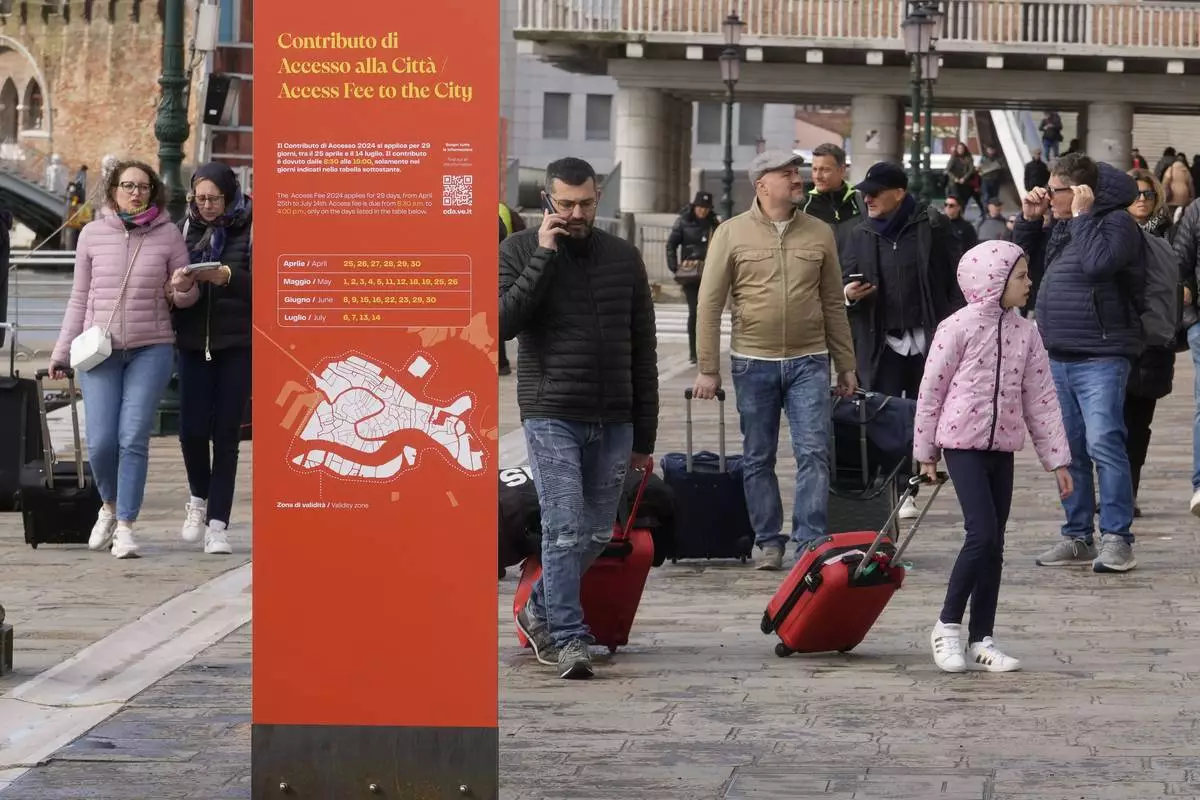
Tourists arrive in Venice, Italy, Thursday, April 25, 2024. The fragile lagoon city of Venice begins a pilot program Thursday to charge daytrippers a 5 euro entry fee that authorities hope will discourage tourists from arriving on peak days. The daytripper tax is being tested on 29 days through July, mostly weekends and holidays starting with Italy's Liberation Day holiday Thursday. Officials expect some 10,000 people will pay the fee to access the city on the first day, downloading a QR code to prove their payment, while another 70,000 will receive exceptions, for example, because they work in Venice or live in the Veneto region. (AP Photo/Luca Bruno)
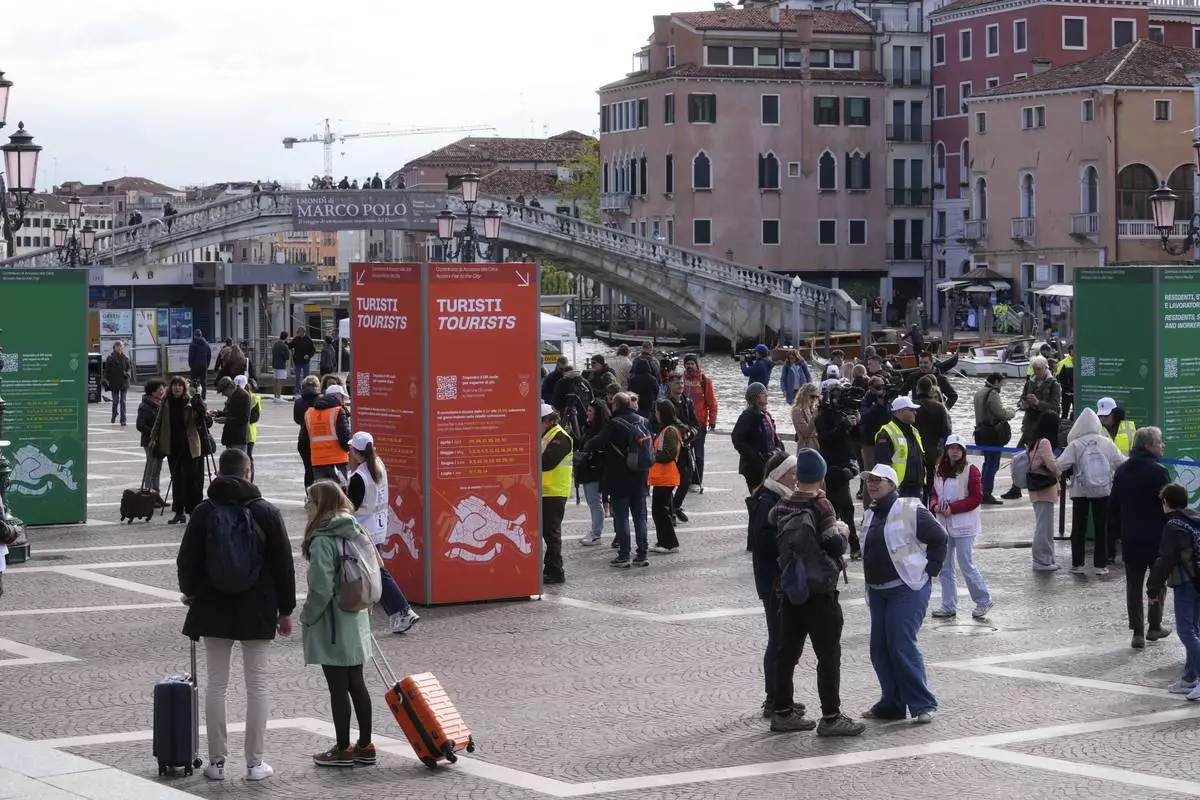
Stewards check tourists QR code access outside the main train station in Venice, Italy, Thursday, April 25, 2024. The fragile lagoon city of Venice begins a pilot program Thursday to charge daytrippers a 5 euro entry fee that authorities hope will discourage tourists from arriving on peak days. The daytripper tax is being tested on 29 days through July, mostly weekends and holidays starting with Italy's Liberation Day holiday Thursday. Officials expect some 10,000 people will pay the fee to access the city on the first day, downloading a QR code to prove their payment, while another 70,000 will receive exceptions, for example, because they work in Venice or live in the Veneto region. (AP Photo/Luca Bruno)
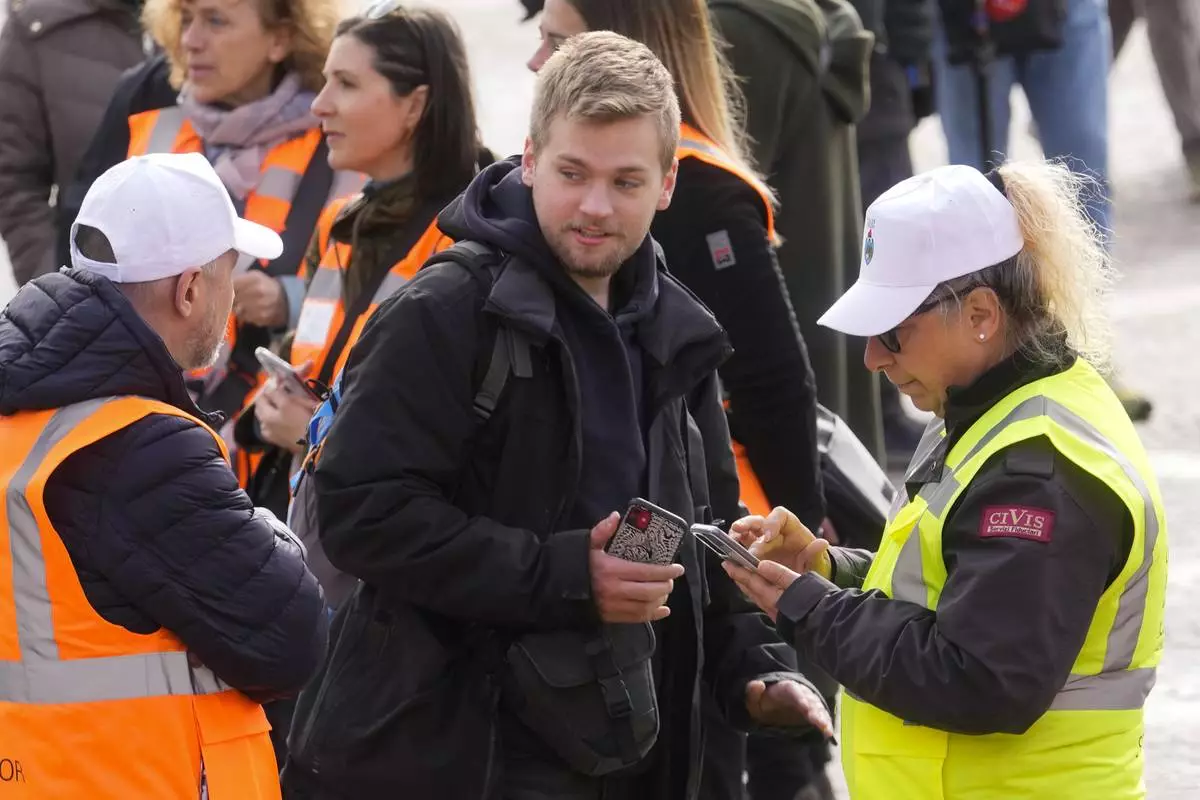
Stewards check a tourist QR code access outside the main train station in Venice, Italy, Thursday, April 25, 2024. The fragile lagoon city of Venice begins a pilot program Thursday to charge daytrippers a 5 euro entry fee that authorities hope will discourage tourists from arriving on peak days. The daytripper tax is being tested on 29 days through July, mostly weekends and holidays starting with Italy's Liberation Day holiday Thursday. Officials expect some 10,000 people will pay the fee to access the city on the first day, downloading a QR code to prove their payment, while another 70,000 will receive exceptions, for example, because they work in Venice or live in the Veneto region. (AP Photo/Luca Bruno)
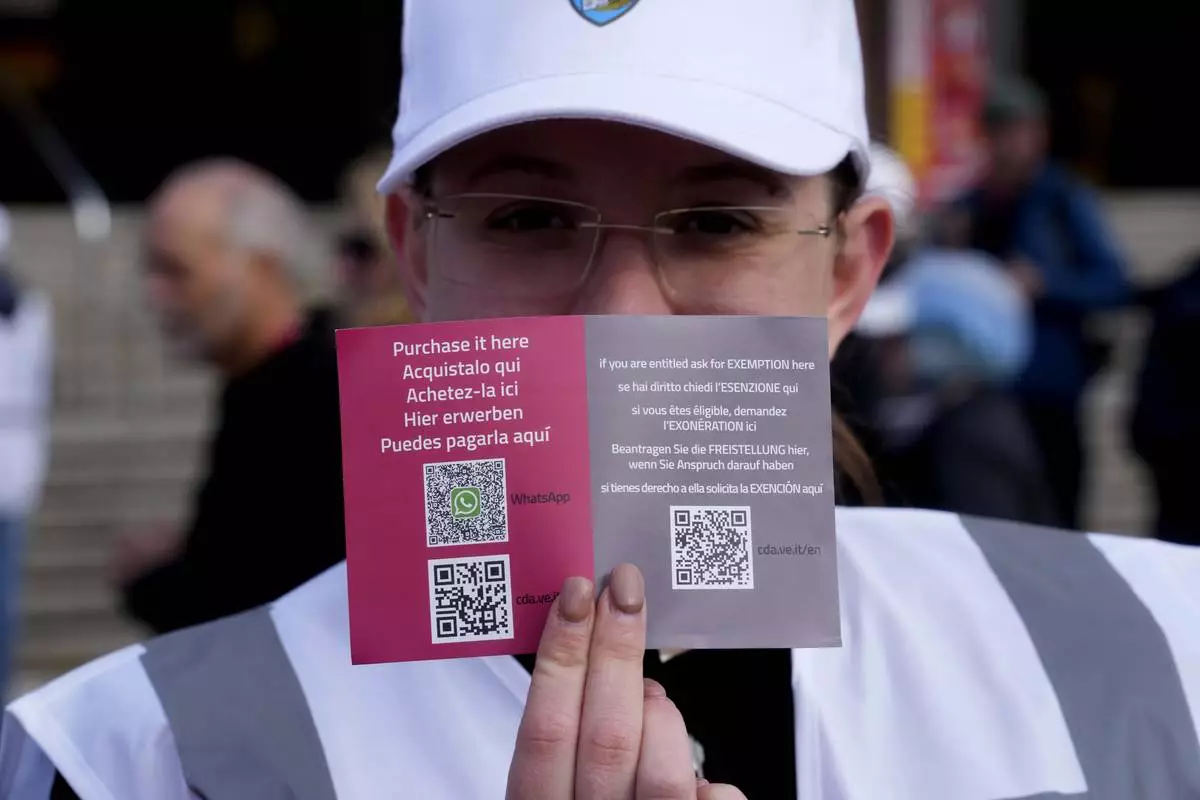
A steward shows the QR code access outside the main train station in Venice, Italy, Thursday, April 25, 2024. The fragile lagoon city of Venice begins a pilot program Thursday to charge daytrippers a 5 euro entry fee that authorities hope will discourage tourists from arriving on peak days. The daytripper tax is being tested on 29 days through July, mostly weekends and holidays starting with Italy's Liberation Day holiday Thursday. Officials expect some 10,000 people will pay the fee to access the city on the first day, downloading a QR code to prove their payment, while another 70,000 will receive exceptions, for example, because they work in Venice or live in the Veneto region. (AP Photo/Luca Bruno)
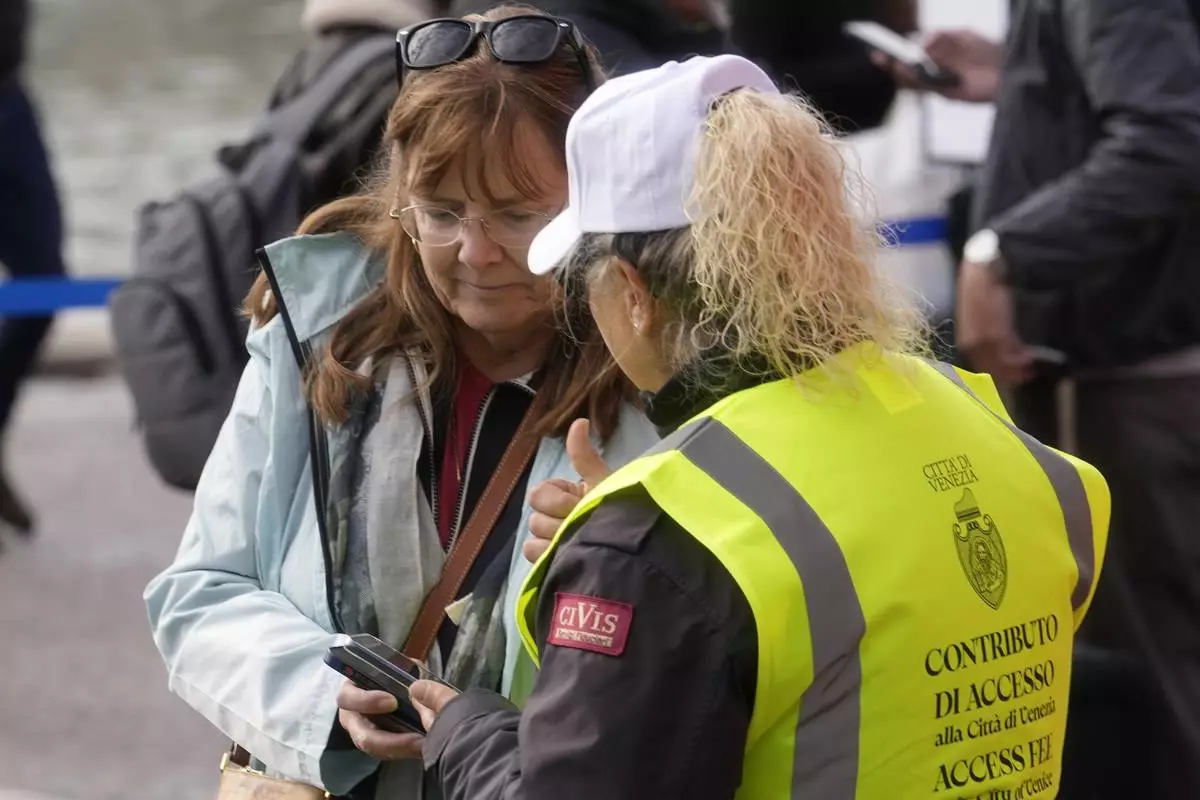
A steward checks a tourist QR code access outside the main train station in Venice, Italy, Thursday, April 25, 2024. The fragile lagoon city of Venice begins a pilot program Thursday to charge daytrippers a 5 euro entry fee that authorities hope will discourage tourists from arriving on peak days. The daytripper tax is being tested on 29 days through July, mostly weekends and holidays starting with Italy's Liberation Day holiday Thursday. Officials expect some 10,000 people will pay the fee to access the city on the first day, downloading a QR code to prove their payment, while another 70,000 will receive exceptions, for example, because they work in Venice or live in the Veneto region. (AP Photo/Luca Bruno)
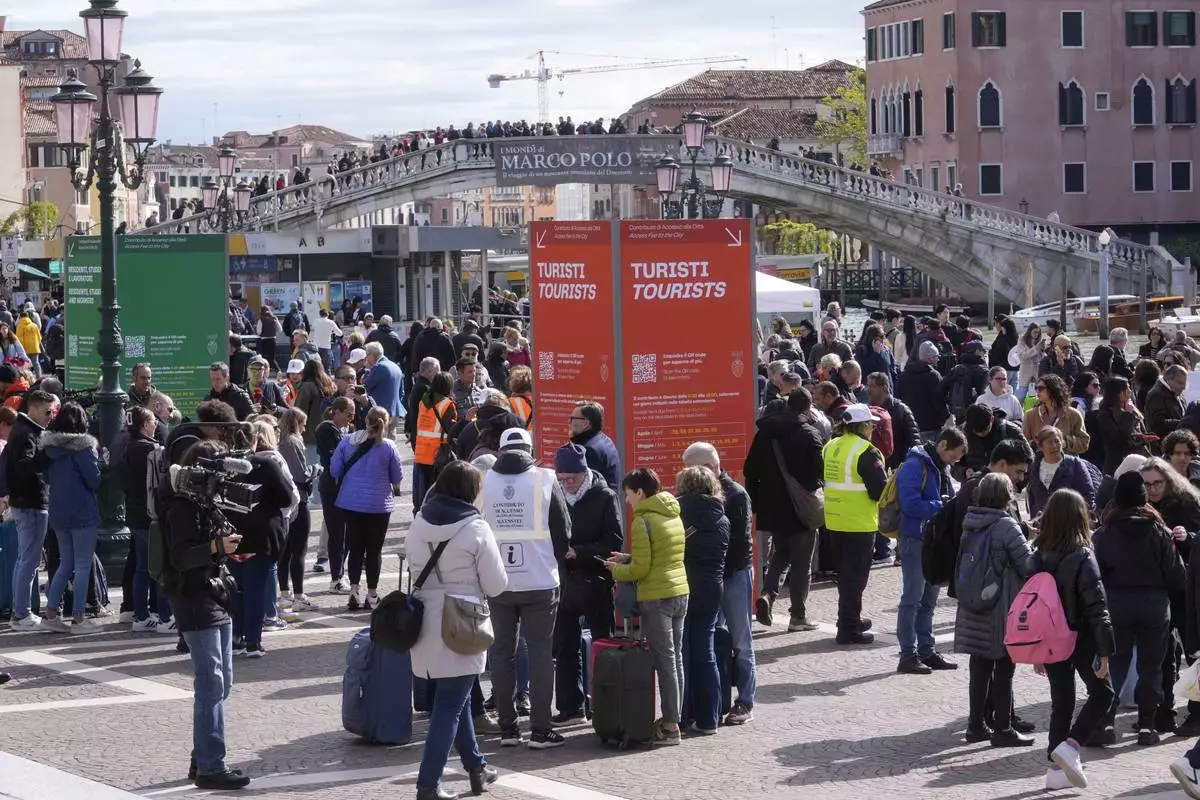
Stewards check tourists QR code access outside the main train station in Venice, Italy, Thursday, April 25, 2024. The fragile lagoon city of Venice begins a pilot program Thursday to charge daytrippers a 5 euro entry fee that authorities hope will discourage tourists from arriving on peak days. The daytripper tax is being tested on 29 days through July, mostly weekends and holidays starting with Italy's Liberation Day holiday Thursday. Officials expect some 10,000 people will pay the fee to access the city on the first day, downloading a QR code to prove their payment, while another 70,000 will receive exceptions, for example, because they work in Venice or live in the Veneto region. (AP Photo/Luca Bruno)
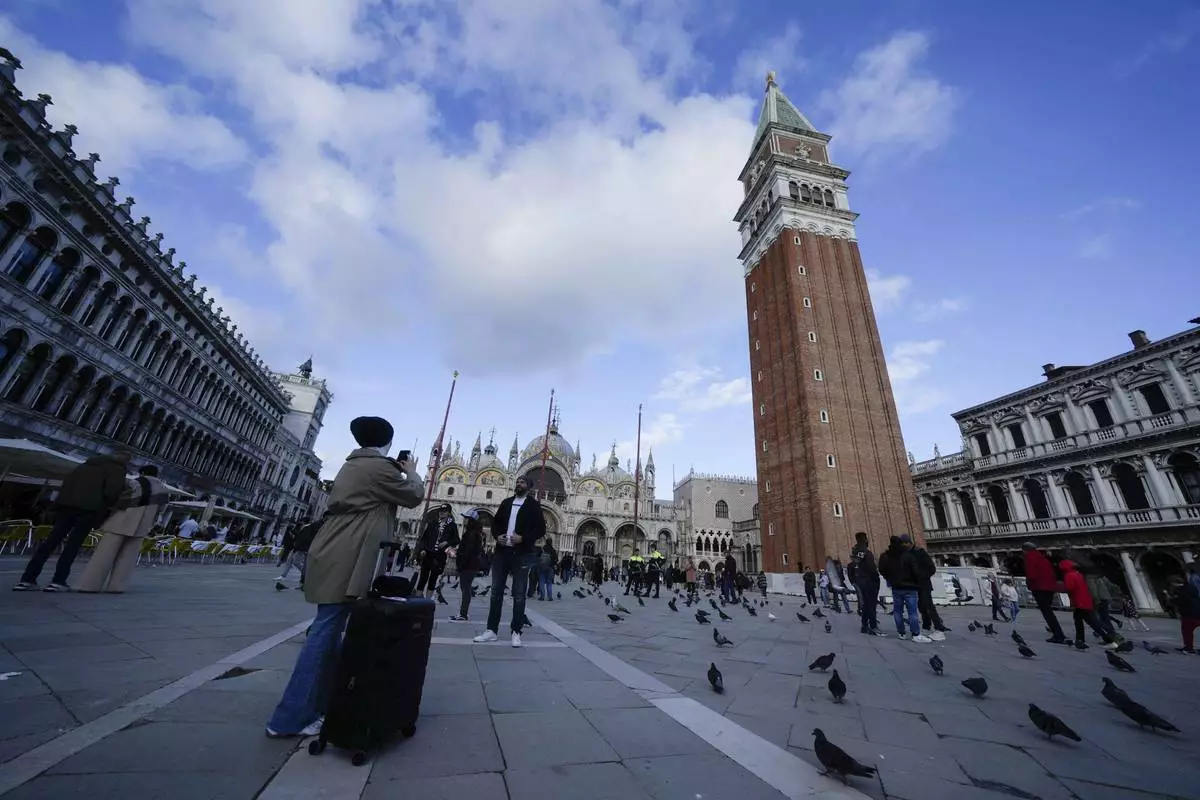
Tourists take pictures at the St. Mark square in Venice, Italy, Wednesday, April 24, 2024. The lagoon city of Venice begins a pilot program Thursday, April 25, 2024 to charge daytrippers a 5 euro entry fee that authorities hope will discourage tourists from arriving on peak days. Officials expect some 10,000 people will pay the fee to access the city on the first day, downloading a QR code to prove their payment. (AP Photo/Luca Bruno)
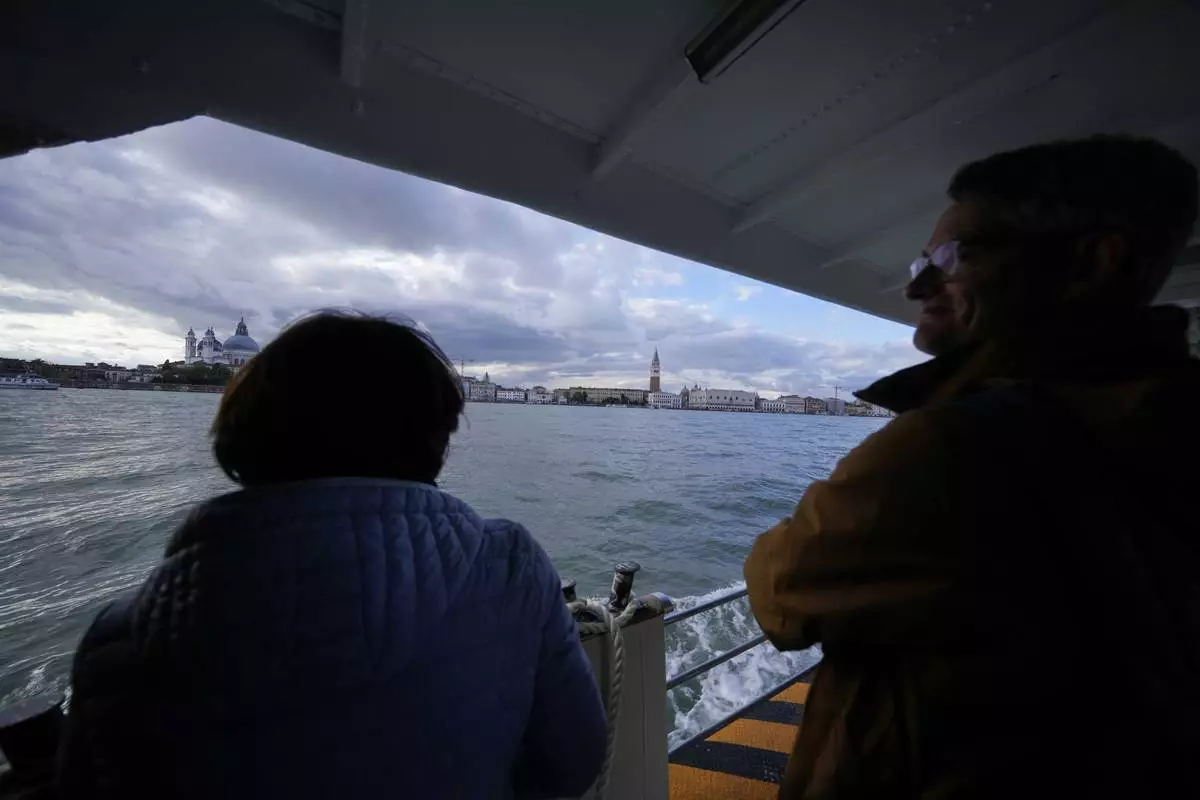
Tourists ride on a ferry boat in Venice, Italy, Wednesday, April 24, 2024. The lagoon city of Venice begins a pilot program Thursday, April 25, 2024 to charge daytrippers a 5 euro entry fee that authorities hope will discourage tourists from arriving on peak days. Officials expect some 10,000 people will pay the fee to access the city on the first day, downloading a QR code to prove their payment. (AP Photo/Luca Bruno)
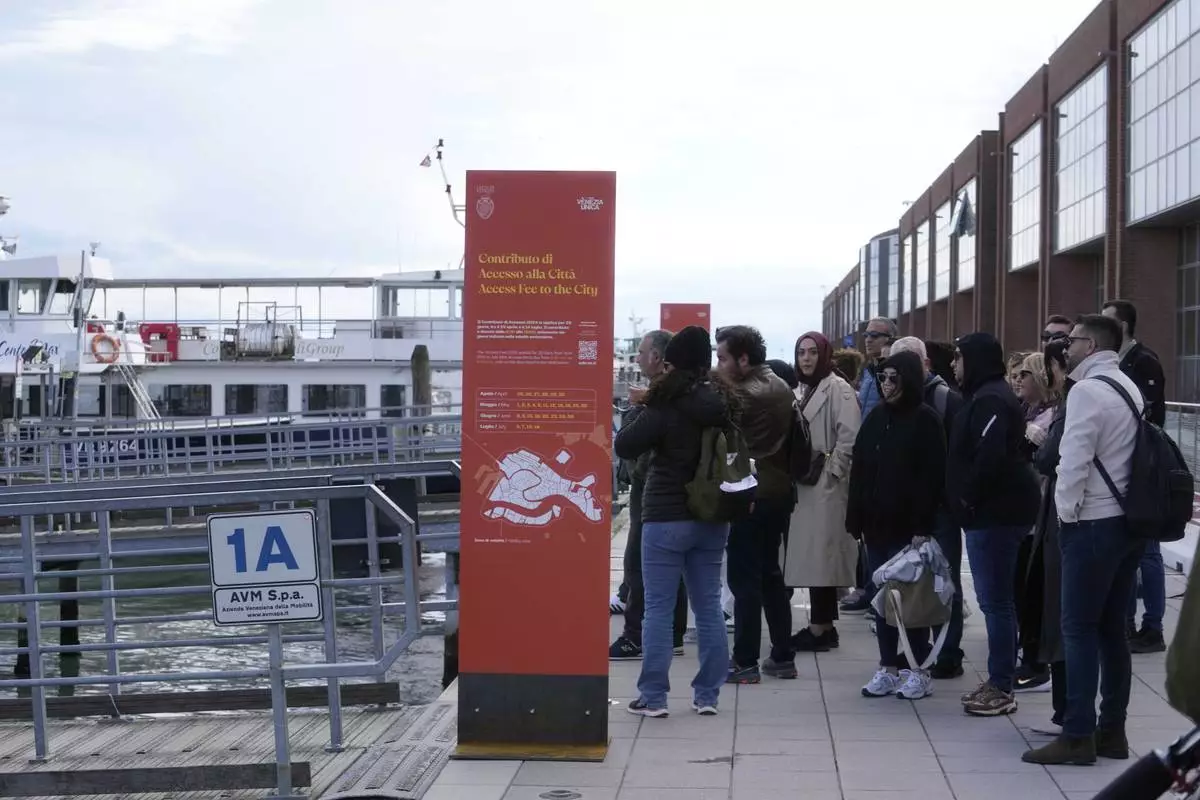
People stand in front of an information board explaining how to pay the tourist tax in Venice, Italy, Wednesday, April 24, 2024. The lagoon city of Venice begins a pilot program Thursday, April 25, 2024 to charge daytrippers a 5 euro entry fee that authorities hope will discourage tourists from arriving on peak days. Officials expect some 10,000 people will pay the fee to access the city on the first day, downloading a QR code to prove their payment. (AP Photo/Luca Bruno)
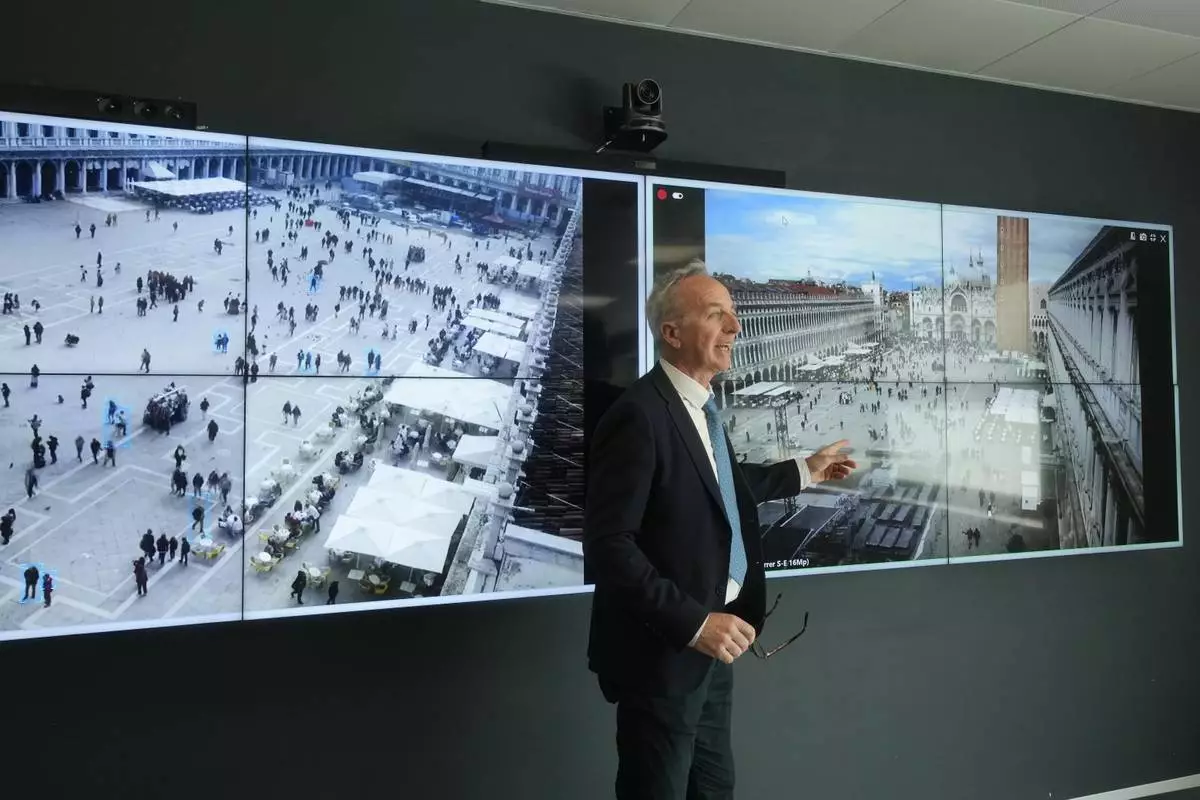
Marco Bettini, director of Venis Informatics System, gestures as he talks to reporters at the police Venice control room, in Venice, Italy, Wednesday, April 24, 2024. The lagoon city of Venice begins a pilot program Thursday, April 25, 2024 to charge daytrippers a 5 euro entry fee that authorities hope will discourage tourists from arriving on peak days. Officials expect some 10,000 people will pay the fee to access the city on the first day, downloading a QR code to prove their payment. (AP Photo/Luca Bruno)
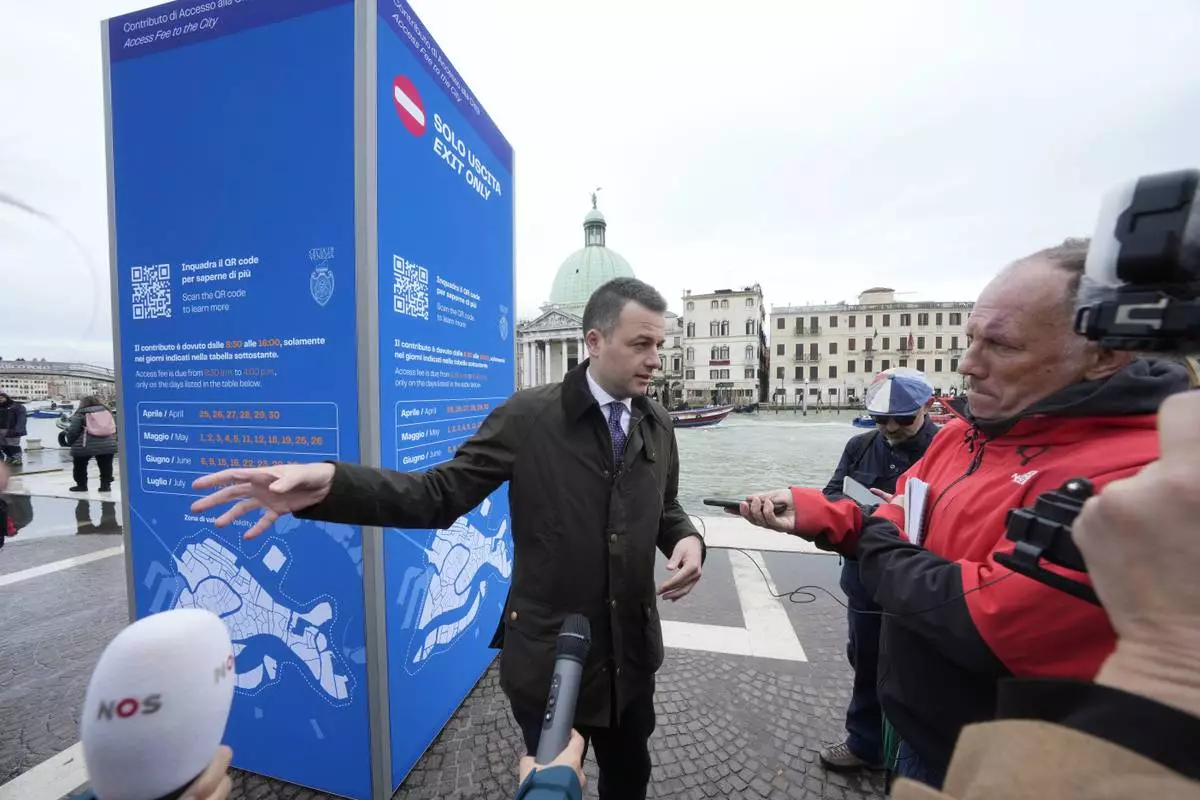
Venice councillor Simone Venturini speaks with reporters in front of a tourist tax totem in Venice, Italy, Wednesday, April 24, 2024. The lagoon city of Venice begins a pilot program Thursday, April 25, 2024 to charge daytrippers a 5 euro entry fee that authorities hope will discourage tourists from arriving on peak days. Officials expect some 10,000 people will pay the fee to access the city on the first day, downloading a QR code to prove their payment. (AP Photo/Luca Bruno)
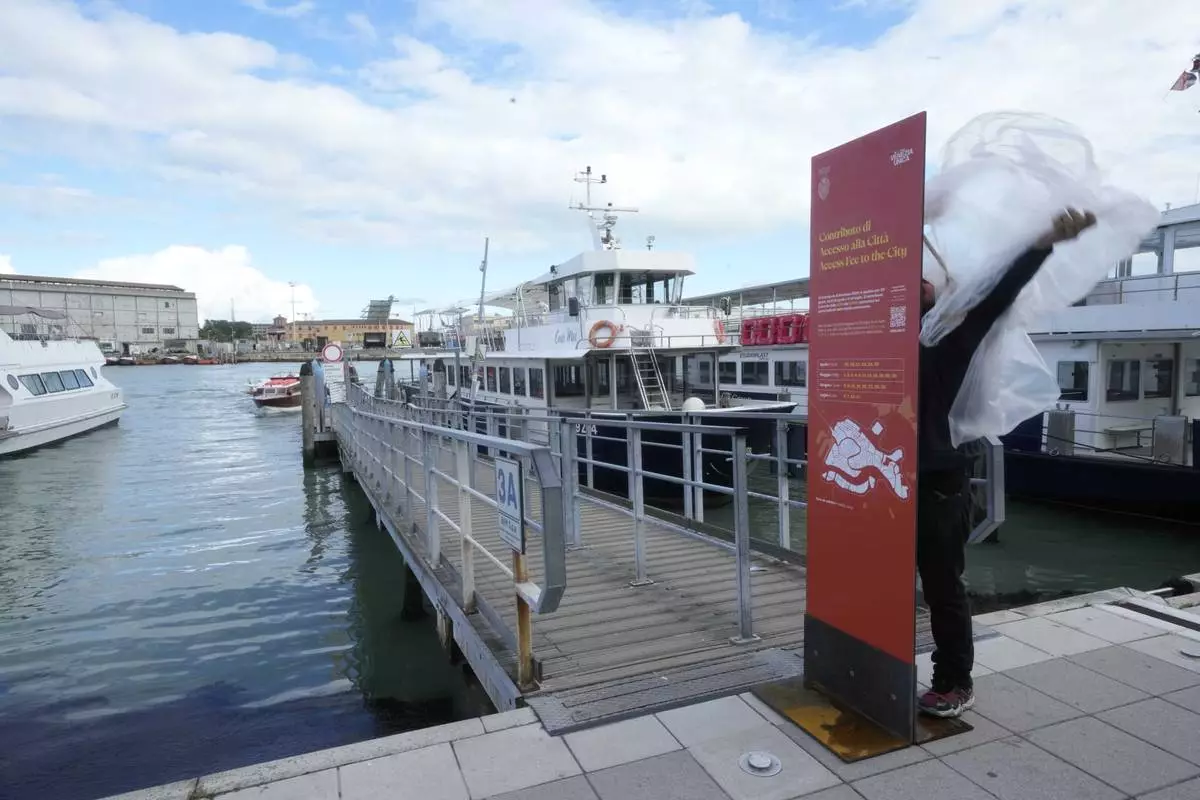
Workers prepare banner explaining how to pay the tourist tax in Venice, Italy, Wednesday, April 24, 2024. The lagoon city of Venice begins a pilot program Thursday, April 25, 2024 to charge daytrippers a 5 euro entry fee that authorities hope will discourage tourists from arriving on peak days. Officials expect some 10,000 people will pay the fee to access the city on the first day, downloading a QR code to prove their payment. (AP Photo/Luca Bruno)
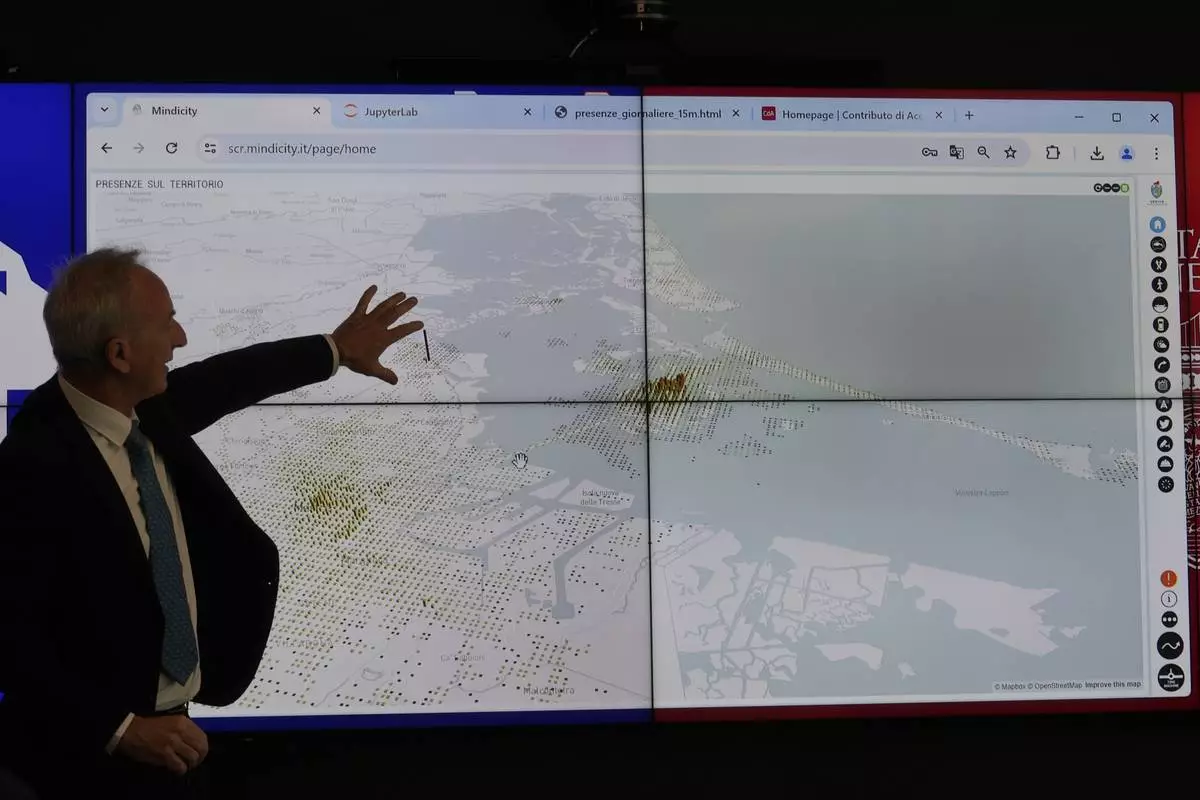
Marco Bettini, director of Venis Informatics System, gestures as he explains the Venice density to reporters at the police Venice control room in Venice, Italy, Wednesday, April 24, 2024. The lagoon city of Venice begins a pilot program Thursday, April 25, 2024 to charge daytrippers a 5 euro entry fee that authorities hope will discourage tourists from arriving on peak days. Officials expect some 10,000 people will pay the fee to access the city on the first day, downloading a QR code to prove their payment. (AP Photo/Luca Bruno)
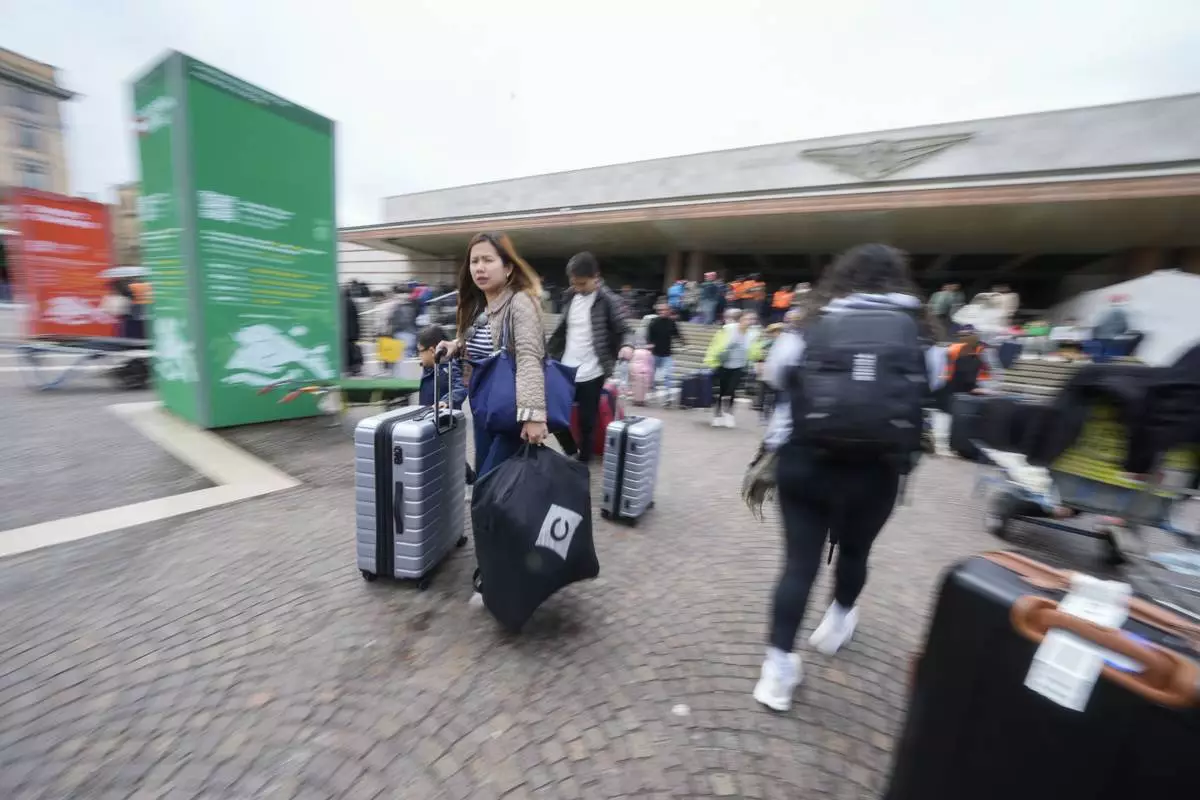
Tourists arrive at the main train station in Venice, Italy, Wednesday, April 24, 2024. The lagoon city of Venice begins a pilot program Thursday, April 25, 2024 to charge daytrippers a 5 euro entry fee that authorities hope will discourage tourists from arriving on peak days. Officials expect some 10,000 people will pay the fee to access the city on the first day, downloading a QR code to prove their payment. (AP Photo/Luca Bruno)
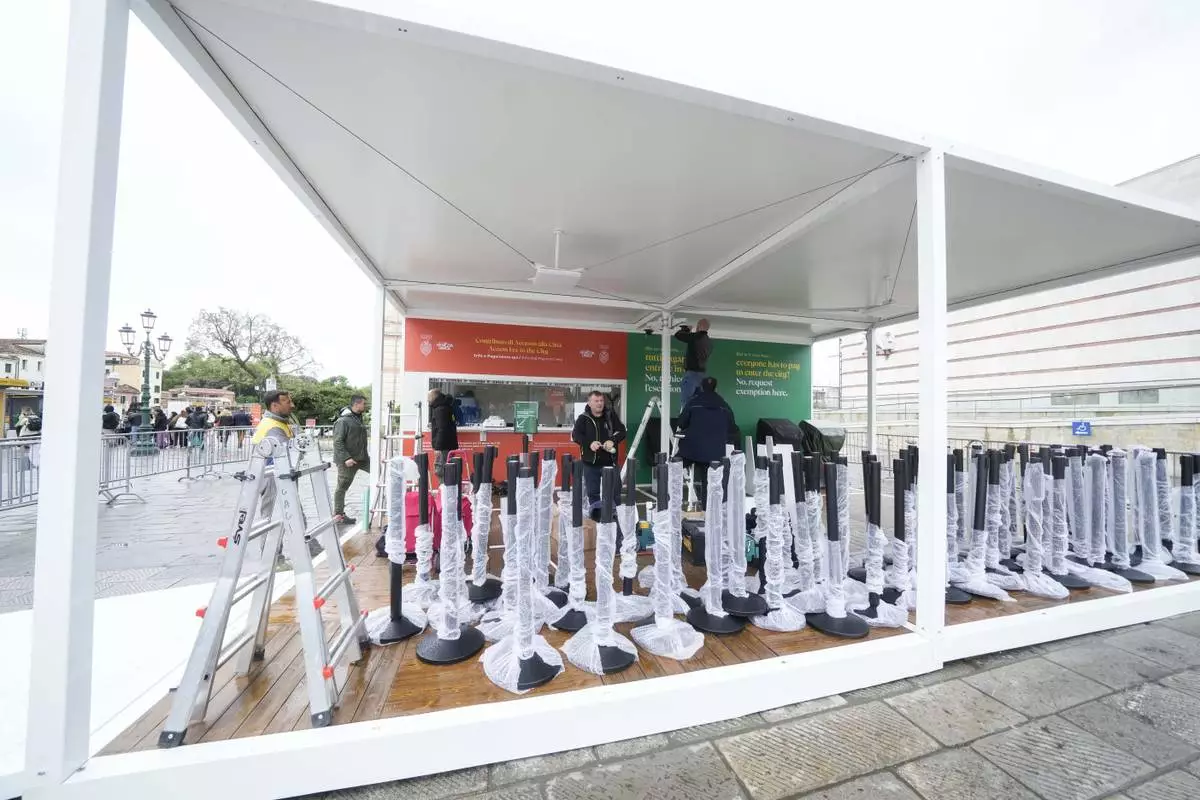
Workers prepare the tourist tax cashier desks outside the main train station in Venice, Italy, Wednesday, April 24, 2024. The lagoon city of Venice begins a pilot program Thursday, April 25, 2024 to charge daytrippers a 5 euro entry fee that authorities hope will discourage tourists from arriving on peak days. Officials expect some 10,000 people will pay the fee to access the city on the first day, downloading a QR code to prove their payment. (AP Photo/Luca Bruno)
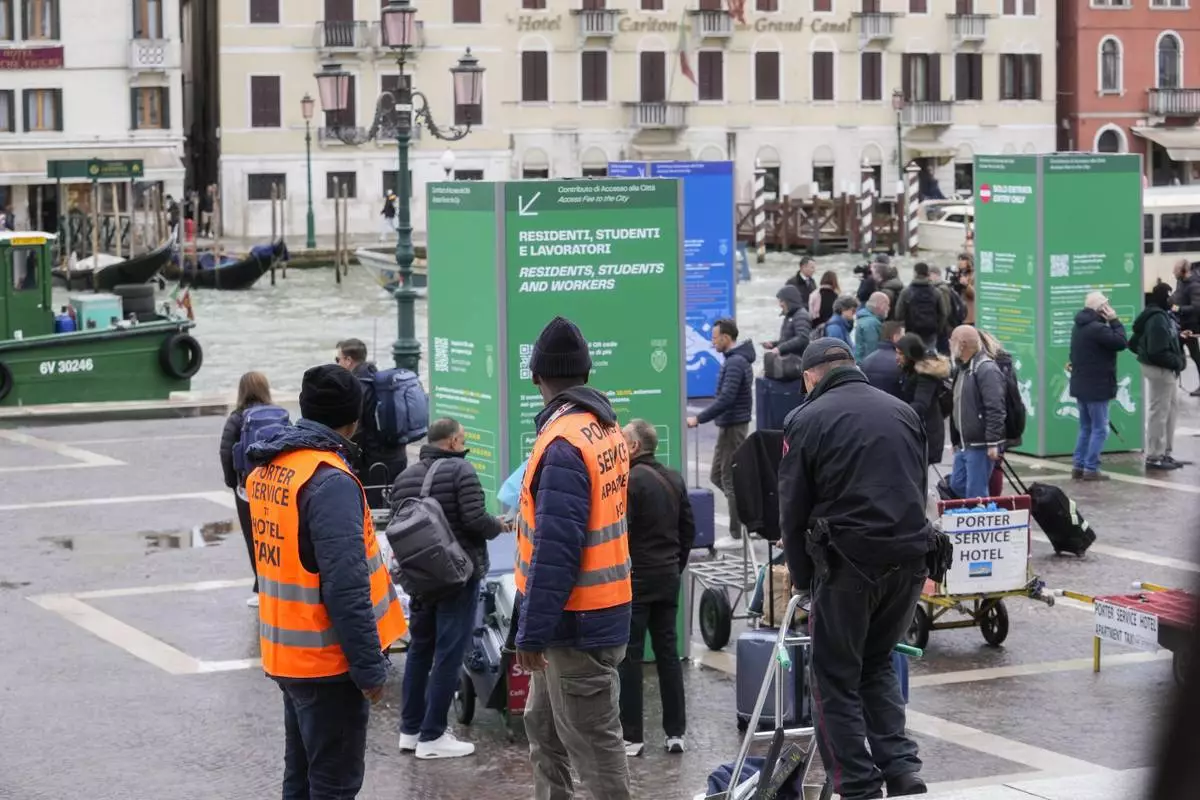
Porters wait for tourists outside the main train station in Venice, Italy, Wednesday, April 24, 2024. The lagoon city of Venice begins a pilot program Thursday, April 25, 2024 to charge daytrippers a 5 euro entry fee that authorities hope will discourage tourists from arriving on peak days. Officials expect some 10,000 people will pay the fee to access the city on the first day, downloading a QR code to prove their payment. (AP Photo/Luca Bruno)
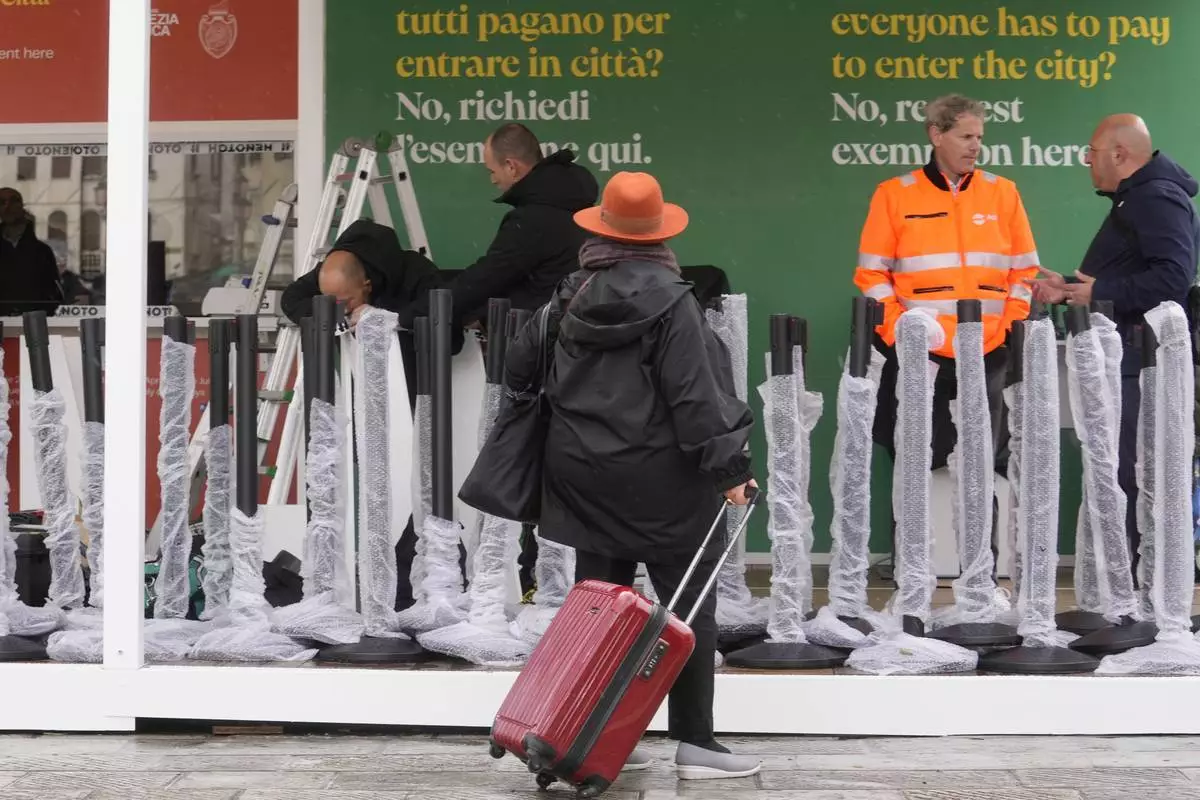
Workers prepare the tourist tax cashier desks outside the main train station in Venice, Italy, Wednesday, April 24, 2024. The lagoon city of Venice begins a pilot program Thursday, April 25, 2024 to charge daytrippers a 5 euro entry fee that authorities hope will discourage tourists from arriving on peak days. Officials expect some 10,000 people will pay the fee to access the city on the first day, downloading a QR code to prove their payment. (AP Photo/Luca Bruno)
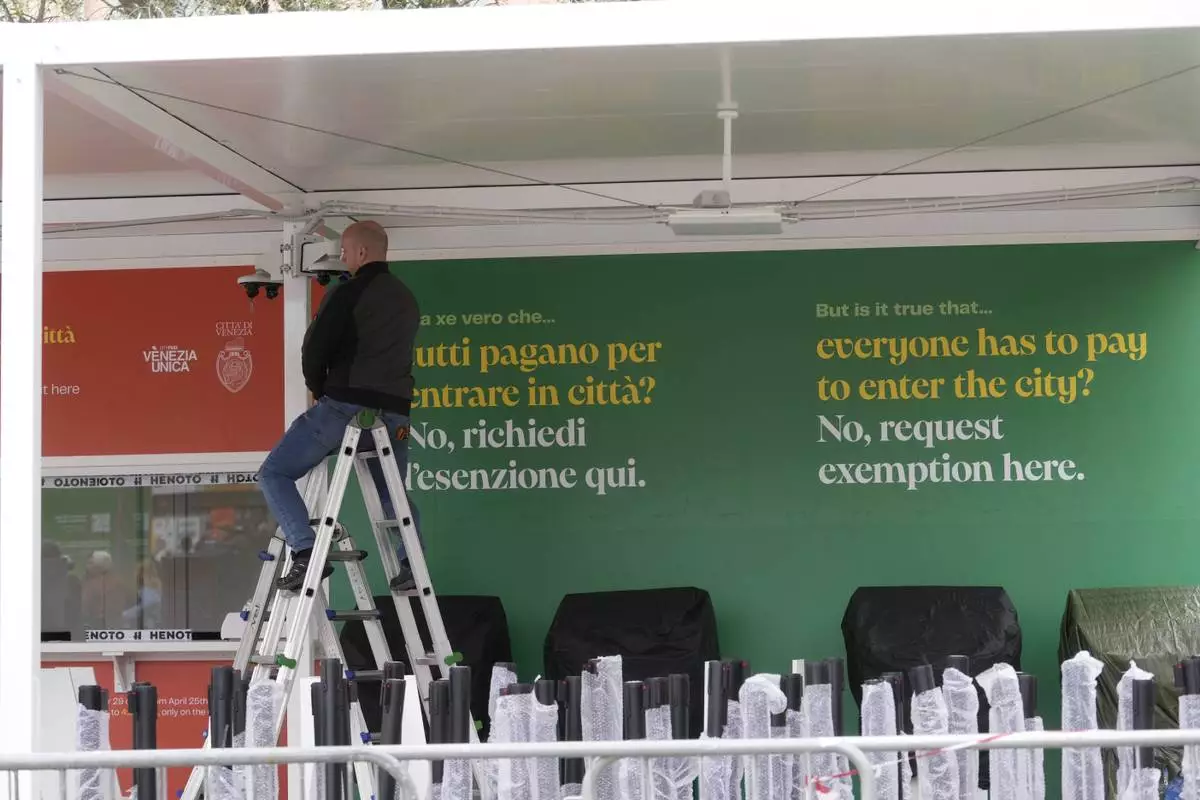
Workers prepare the tourist tax cashier desks outside the main train station in Venice, Italy, Wednesday, April 24, 2024. The lagoon city of Venice begins a pilot program Thursday, April 25, 2024 to charge daytrippers a 5 euro entry fee that authorities hope will discourage tourists from arriving on peak days. Officials expect some 10,000 people will pay the fee to access the city on the first day, downloading a QR code to prove their payment. (AP Photo/Luca Bruno)
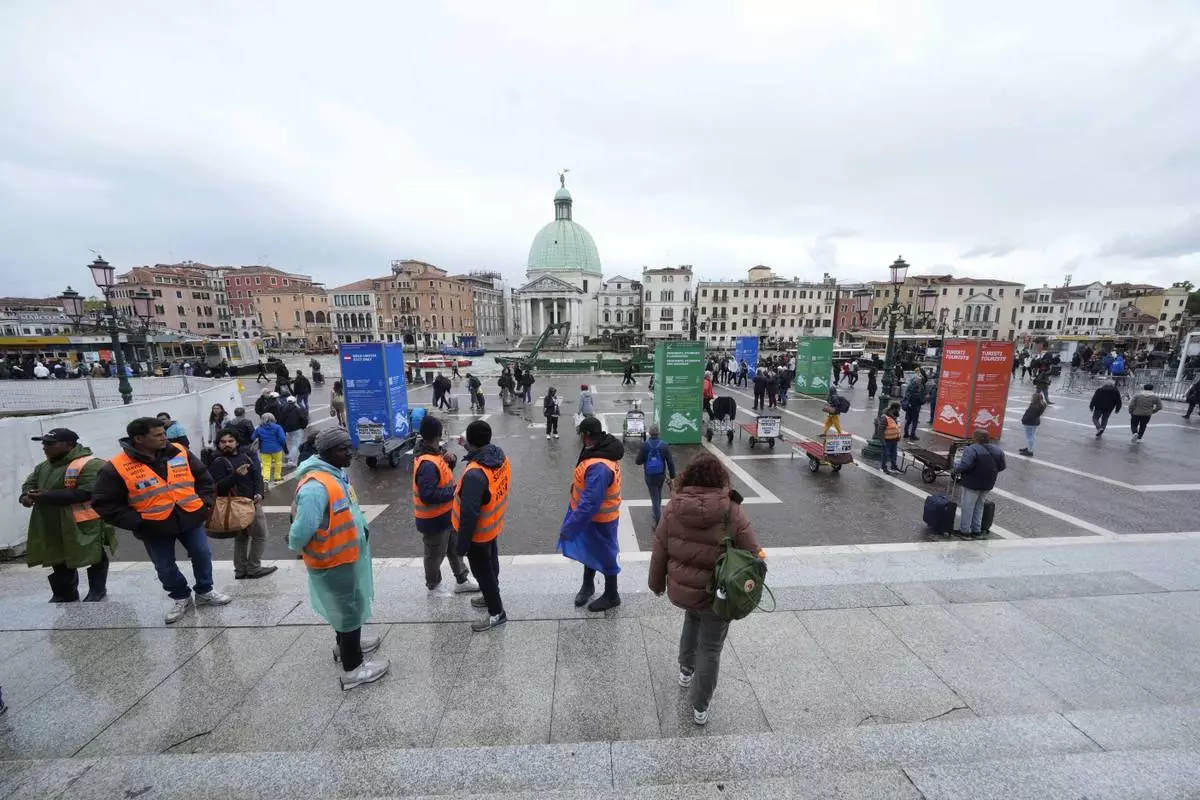
Porters wait for tourists outside the main train station in Venice, Italy, Wednesday, April 24, 2024. The lagoon city of Venice begins a pilot program Thursday, April 25, 2024 to charge daytrippers a 5 euro entry fee that authorities hope will discourage tourists from arriving on peak days. Officials expect some 10,000 people will pay the fee to access the city on the first day, downloading a QR code to prove their payment. (AP Photo/Luca Bruno)
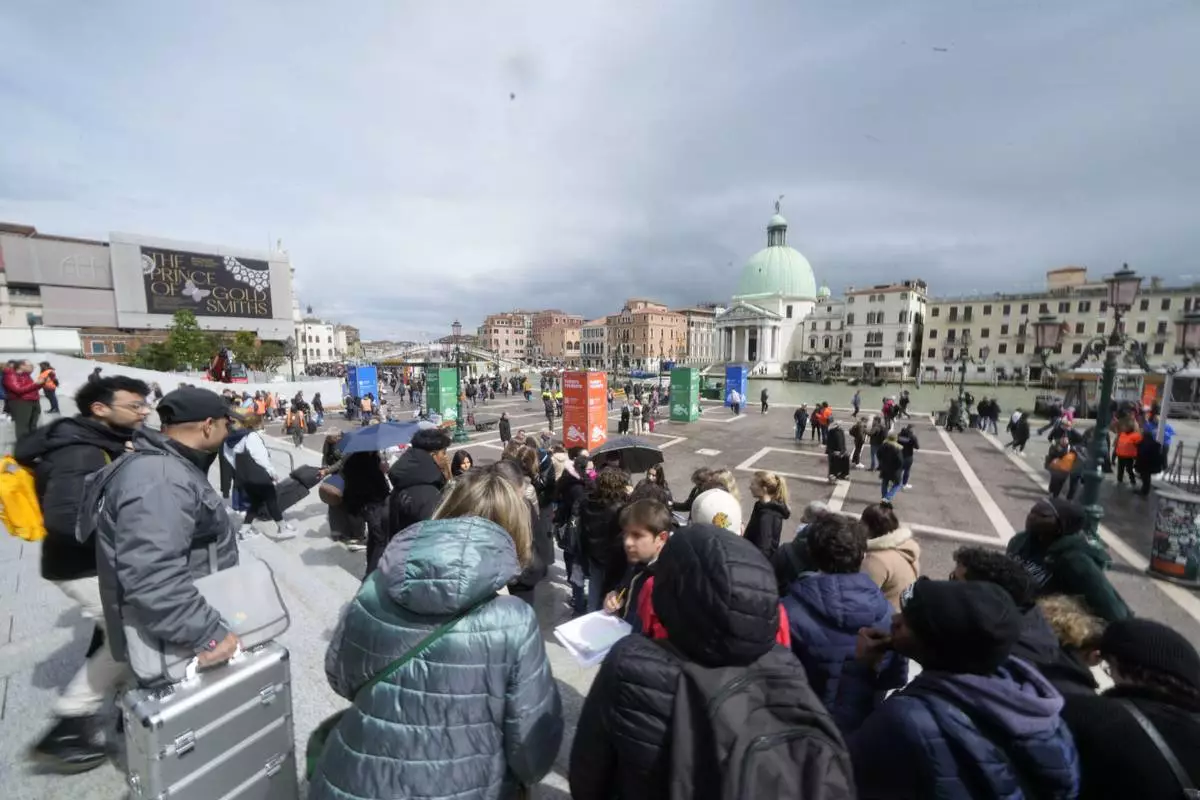
Tourists arrive outside the main train station in Venice, Italy, Wednesday, April 24, 2024. The lagoon city of Venice begins a pilot program Thursday, April 25, 2024 to charge daytrippers a 5 euro entry fee that authorities hope will discourage tourists from arriving on peak days. Officials expect some 10,000 people will pay the fee to access the city on the first day, downloading a QR code to prove their payment. (AP Photo/Luca Bruno)
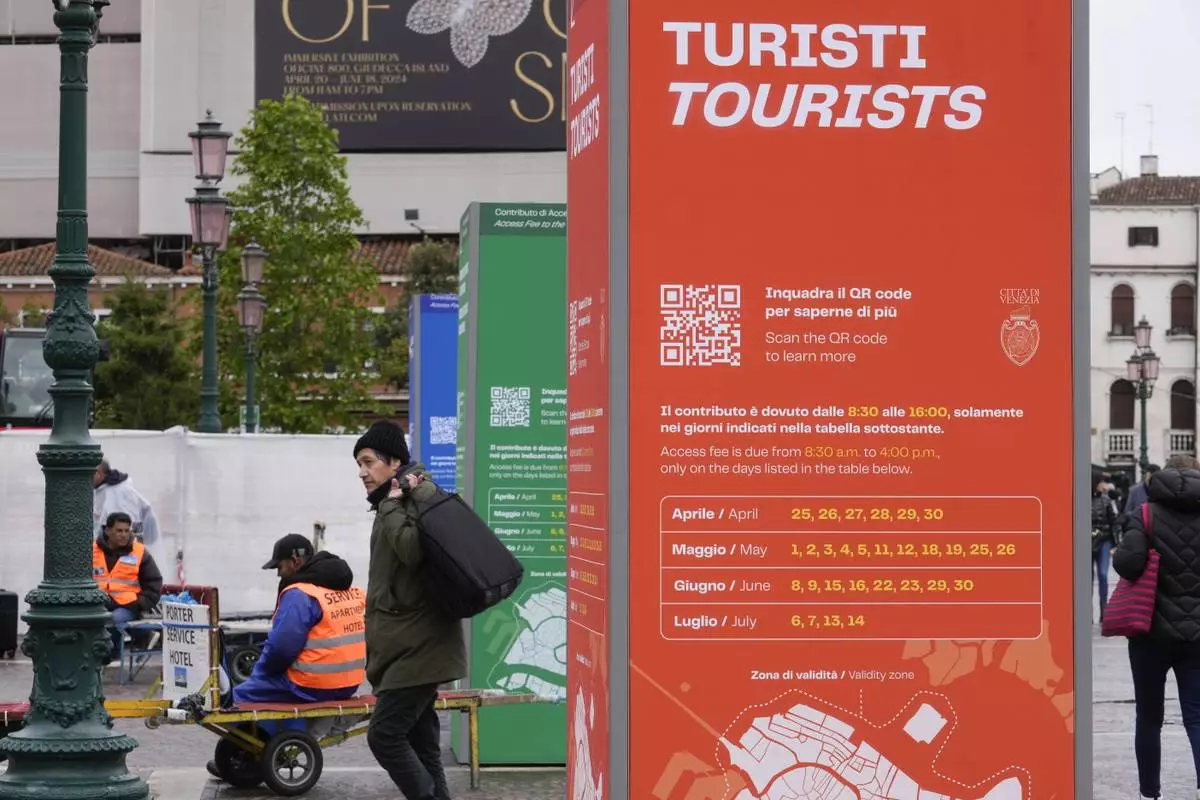
Tourist information boards are seen outside the main train station in Venice, Italy, Wednesday, April 24, 2024. The lagoon city of Venice begins a pilot program Thursday, April 25, 2024 to charge daytrippers a 5 euro entry fee that authorities hope will discourage tourists from arriving on peak days. Officials expect some 10,000 people will pay the fee to access the city on the first day, downloading a QR code to prove their payment. (AP Photo/Luca Bruno)
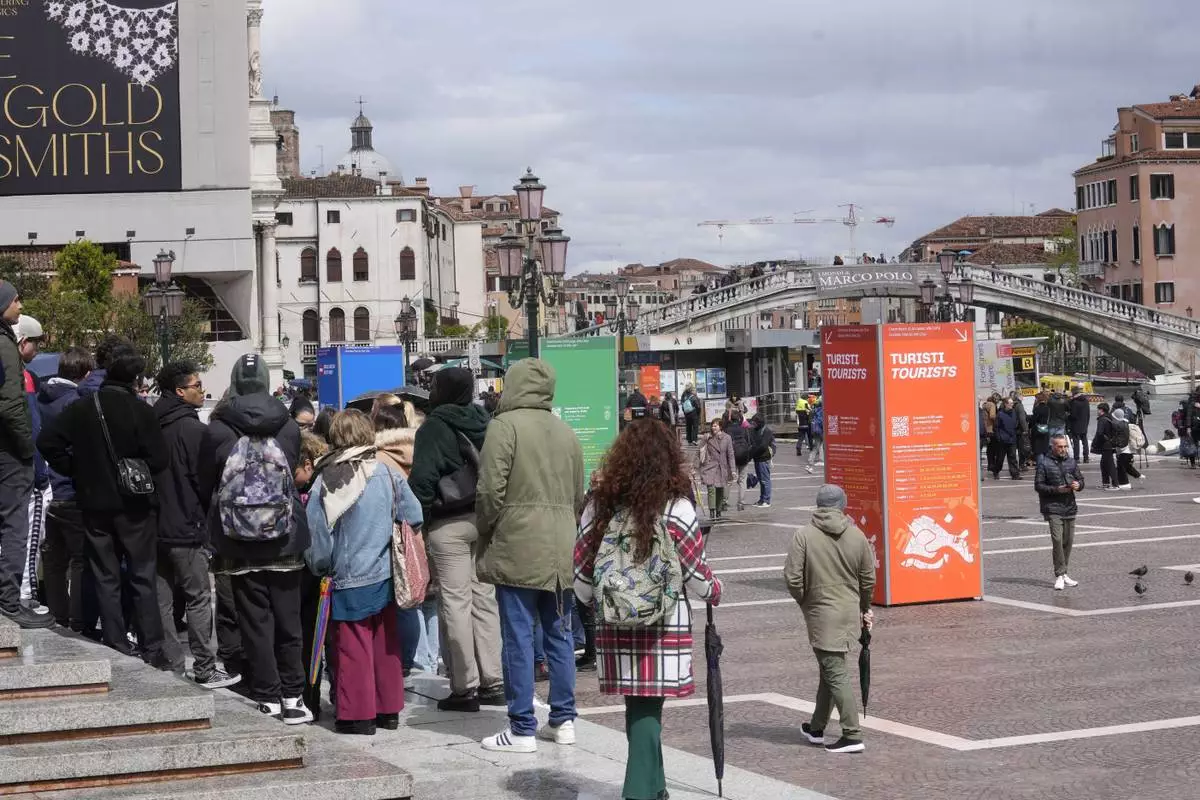
Tourists arrive outside the main train station in Venice, Italy, Wednesday, April 24, 2024. The lagoon city of Venice begins a pilot program Thursday, April 25, 2024 to charge daytrippers a 5 euro entry fee that authorities hope will discourage tourists from arriving on peak days. Officials expect some 10,000 people will pay the fee to access the city on the first day, downloading a QR code to prove their payment. (AP Photo/Luca Bruno)































